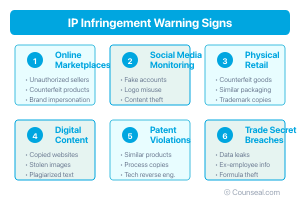Intellectual Property Disputes: What to Do When Your Rights are Infringed

by Counseal Team
Updated June 3, 2025

For Nigerian entrepreneurs, intellectual property (IP) represents the backbone of innovation and competitive advantage. Your IP encompasses the unique elements that distinguish your business—from proprietary technology and distinctive branding to creative content and trade secrets. However, the value of IP extends far beyond mere ownership; it requires active protection to maintain its worth.
- Understanding Intellectual Property: The Entrepreneur’s Shield
- Understanding Intellectual Property Disputes
- Identifying IP Infringement Signs
- Steps to Take When Your IP Rights Are Infringed
- International IP Enforcement Challenges
- Preventing Future IP Disputes
- Key Takeaways for Nigerian Entrepreneurs
Understanding Intellectual Property: The Entrepreneur’s Shield
For Nigerian entrepreneurs, intellectual property (IP) represents the backbone of innovation and competitive advantage. Your IP encompasses the unique elements that distinguish your business—from proprietary technology and distinctive branding to creative content and trade secrets. However, the value of IP extends far beyond mere ownership; it requires active protection to maintain its worth.
The World Intellectual Property Organisation reports that businesses with robust IP protection demonstrate accelerated growth rates and attract higher investor confidence. This correlation between IP protection and business success reflects the tangible value investors place on well-protected intellectual assets. Companies like Coca-Cola and Apple built their market dominance partly through strategic IP management, maintaining competitive advantages through comprehensive protection of their innovations, logos, and designs.
The Crucial Role of IP in Business Growth
Intellectual property serves as both a defensive shield and an offensive weapon in competitive markets. Beyond protection, IP assets create multiple revenue streams through licensing opportunities, partnerships, and enhanced valuation during investment rounds or acquisitions. For Nigerian businesses seeking international expansion, IP protection becomes even more critical as it establishes credibility and legal standing in foreign markets.
Research from the Nigerian Copyright Commission indicates that businesses with registered IP assets experience 23% higher revenue growth compared to those without formal protection. This growth stems from increased consumer confidence, reduced competitive threats, and enhanced ability to enforce exclusive rights.
Common Scenarios Where IP Disputes Arise
IP disputes manifest across several categories, each presenting unique challenges:
Trademark Disputes occur when competitors adopt similar brand names, logos, or distinctive elements that create consumer confusion. These disputes are particularly common in Nigeria’s growing e-commerce sector, where brand recognition drives customer loyalty.
Patent Infringement affects businesses with proprietary technology or innovative processes. The pharmaceutical and technology sectors experience frequent patent disputes, often involving reverse engineering or unauthorised reproduction of patented inventions.
Copyright Violations encompass unauthorised use of creative works, including written content, software code, marketing materials, and multimedia productions. The rise of digital platforms has increased both the visibility and vulnerability of copyrighted materials.
Trade Secret Breaches involve the unauthorised disclosure or acquisition of confidential business information, such as customer databases, manufacturing processes, or strategic plans. These violations often occur through departing employees or business partners.
Get Expert Guidance on Your Nigerian Business Journey
Join 1000+ entrepreneurs who’ve transformed their Nigerian business plans with our strategic guidance. In one focused session, unlock:
- Market-ready opportunity assessment
- Regulatory compliance roadmap
- Implementation strategy tailored to your business
- Cost framework and resource planning
What You’ll Receive:
- Personalized Strategy Session with a Nigerian market specialist
- Custom Implementation Roadmap based on your specific business goals
- Regulatory Checklist tailored to your industry
- Priority Access to our implementation team when you’re ready
How It Works:
- Select your preferred time slot below
- Complete a brief business assessment
- Join your private Zoom session
- Receive your actionable implementation plan
Limited availability — Only 8 sessions offered each week
Understanding Intellectual Property Disputes
Intellectual property disputes represent legal conflicts over the ownership, use, or infringement of creative works and innovations. In Nigeria’s evolving business landscape, these disputes have become increasingly sophisticated, requiring strategic approaches that balance legal action with business objectives.
Definition and Scope of IP Disputes
IP disputes emerge when individuals or entities use intellectual property without authorisation or falsely claim ownership of protected assets. Under Nigerian law, IP rights are territorial, meaning protection must be secured within Nigeria’s jurisdiction to ensure enforceability. The Nigerian Trademarks, Patents and Designs Registry oversees formal registration processes, whilst enforcement relies on both civil and criminal legal frameworks.
The scope of IP disputes extends beyond simple infringement to include licensing disagreements, ownership challenges, and international enforcement issues. Modern disputes often involve complex digital elements, cross-border transactions, and multiple types of IP simultaneously.
Types of IP Infringements
Trademark Infringement occurs when unauthorised parties use marks that are identical or confusingly similar to registered trademarks. Nigerian courts apply the “likelihood of confusion” test, examining factors such as similarity of marks, related goods or services, and consumer sophistication levels.
Copyright Infringement involves reproduction, distribution, or public display of copyrighted works without permission. Nigerian copyright law protects original literary, artistic, and musical works automatically upon creation, though registration provides enhanced enforcement capabilities.
Patent Infringement encompasses the unauthorised making, using, selling, or importing of patented inventions. Nigeria’s patent system requires formal registration and provides 20-year protection terms for qualifying inventions.
Trade Secret Violations cover the misappropriation of confidential business information that derives economic value from secrecy. Unlike other IP forms, trade secrets require no registration but demand active measures to maintain confidentiality.
Notable IP Dispute Examples
The Apple versus Samsung litigation series demonstrates the global stakes of IP disputes. Apple was ultimately awarded $539 million in damages for design patent infringement, illustrating how IP disputes can involve substantial financial consequences extending across multiple jurisdictions.
In Nigeria, significant disputes have emerged in the pharmaceutical sector, where the National Agency for Food and Drug Administration and Control (NAFDAC) actively combats counterfeit medications. Lagos State’s enforcement initiatives have resulted in numerous seizures and prosecutions, highlighting the public health implications of IP infringement.
The telecommunications sector has witnessed notable patent disputes involving foreign technology companies and local operators, particularly regarding mobile payment systems and network infrastructure patents.
Identifying IP Infringement Signs
Unauthorised Use of Trademarks or Brand Identity
Brand identity theft manifests through unauthorised use of registered trademarks, distinctive logos, colour schemes, or trade dress. Nigerian businesses should monitor online marketplaces, social media platforms, and physical retail locations for unauthorised brand usage.
Registration with the Nigerian Trademarks, Patents and Designs Registry provides legal presumption of ownership and enhances enforcement capabilities. The registry’s online database allows businesses to verify trademark status and monitor new applications that might conflict with existing rights.
Counterfeiting and Piracy
Counterfeiting remains a persistent challenge across Nigeria’s consumer markets. The Standards Organisation of Nigeria (SON) and NAFDAC collaborate with IP owners to identify and prosecute counterfeit goods, particularly in pharmaceuticals, electronics, and consumer products.
Effective anti-counterfeiting strategies include implementing authentication technologies such as holograms, QR codes, or blockchain verification systems. These technologies create additional barriers for counterfeiters whilst providing consumers with verification methods.
Patent Infringement in Product Development
Patent infringement detection requires systematic monitoring of competitor products, patent publications, and industry developments. The Nigerian Patent Database and international patent search tools enable businesses to identify potentially infringing products or technologies.
Reverse engineering analysis can reveal patent infringement, though businesses must distinguish between legitimate competitive analysis and potential infringement. Professional patent search services provide comprehensive analysis capabilities for complex technical products.
Misuse of Copyrighted Material
Digital copyright infringement has increased significantly with online content proliferation. Search engines, social media monitoring tools, and specialised copyright detection services help identify unauthorised use of copyrighted materials.
Content creators should implement digital watermarking, metadata preservation, and regular monitoring to protect their copyrighted works. Nigerian copyright law provides both civil and criminal remedies for infringement, including statutory damages and injunctive relief.
Breach of Confidentiality Agreements
Trade secret violations often involve former employees, business partners, or service providers who breach confidentiality obligations. The Ponemon Institute’s 2023 study found that data breaches cost an average of $4.45 million globally, emphasising the financial impact of confidentiality breaches.
Preventive measures include comprehensive non-disclosure agreements, access controls, employee training programmes, and exit procedures for departing personnel. Digital forensics capabilities can help trace unauthorised disclosures and support enforcement actions.

Steps to Take When Your IP Rights Are Infringed
Gather Comprehensive Evidence
Evidence collection forms the foundation of successful IP enforcement. Documentation must be thorough, authenticated, and legally admissible to support your claims effectively.
Documentation Requirements
Create detailed records of all infringement instances, including dates, locations, parties involved, and specific infringement details. Maintain chronological logs that demonstrate the scope and duration of infringement activities. Professional investigators or legal consultants can provide guidance on evidence collection standards that meet Nigerian court requirements.
Collecting Proof: Screenshots, Contracts, Timestamps
Digital evidence requires careful preservation to maintain authenticity. Screenshots should include visible URLs, timestamps, and metadata where possible. Third-party screenshot services provide authenticated captures that carry enhanced legal weight.
Preserve all relevant contracts, agreements, and correspondence that establish your IP ownership or rights. Email communications, licensing agreements, and registration certificates create the ownership foundation necessary for enforcement actions.
Timestamp verification through professional services or notarisation adds credibility to your evidence collection. Some businesses employ blockchain timestamping for irrefutable proof of document creation or modification dates.
Engaging Third-Party Verification
Independent verification strengthens your evidence package significantly. Professional IP analysts, forensic investigators, or technical experts can provide unbiased assessments of infringement claims.
Industry experts familiar with your specific sector can evaluate technical aspects of patent or trade secret infringement. Their professional opinions carry substantial weight in legal proceedings and settlement negotiations.
Issue Cease and Desist Communications
A well-crafted cease and desist letter serves as your initial formal response to IP infringement. This communication establishes your position, demonstrates serious intent, and often resolves disputes without expensive litigation.
Key Components of Effective Cease and Desist Letters
Professional cease and desist letters must include specific elements:
- Clear identification of your IP rights with registration numbers and dates
- Detailed description of the infringing activities
- Specific demands for cessation of infringing activities
- Reasonable compliance deadline (typically 10–14 days)
- Consequences of non-compliance, including potential legal action
- Professional tone that maintains possibility for amicable resolution
Strategic Timing and Delivery Methods
Send cease and desist letters promptly after discovering infringement to demonstrate vigilance in protecting your rights. Registered mail or courier services with delivery confirmation provide proof of receipt.
Consider the business relationship context when crafting your communication. Former partners or employees may respond better to diplomatic language, whilst unknown infringers may require firmer approaches.
Template for Nigerian Business Context
[Your Business Letterhead]
[Date]
[Recipient Name and Address]
Subject: Cease and Desist – Unauthorised Use of [Trademark/Copyright/Patent]
Dear [Recipient Name],
This letter serves formal notice that you are unlawfully infringing our intellectual property rights through [specific description of infringing activity]. Our [trademark/copyright/patent] registration number [number], dated [date], provides exclusive rights to [description of protected IP].
Your unauthorised use of our intellectual property violates Nigerian [relevant IP law] and causes substantial damage to our business interests. We demand immediate cessation of all infringing activities within fourteen (14) days of receiving this letter.
Failure to comply will compel us to pursue all available legal remedies, including monetary damages, injunctive relief, and legal costs recovery.
We prefer amicable resolution and invite your prompt response confirming compliance with our demands.
Yours sincerely,
[Your Name and Title]
[Contact Information]
Attempt Business-Friendly Resolution
Alternative dispute resolution methods often provide faster, less expensive solutions than traditional litigation whilst preserving business relationships.
Benefits of Negotiation and Mediation
Negotiation allows parties to control outcomes rather than relying on judicial decisions. The American Bar Association reports that 95% of disputes settle before trial, demonstrating the effectiveness of negotiated resolutions.
Mediation introduces neutral third parties who facilitate communication and help identify mutually beneficial solutions. The Centre for Effective Dispute Resolution documents a 75% success rate for mediation processes.
Cost considerations strongly favour alternative dispute resolution, as litigation expenses can exceed potential damages, particularly for smaller businesses. Time savings allow business owners to focus on operations rather than extended legal proceedings.
Engaging Professional Mediators
IP-specialised mediators understand technical aspects of intellectual property disputes and industry-specific challenges. The Lagos Court of Arbitration provides mediation services specifically designed for commercial disputes, including IP matters.
International mediation becomes essential for cross-border disputes involving Nigerian businesses and foreign entities. Organisations like the World Intellectual Property Organisation offer specialised IP mediation services.
Initiate Legal Proceedings When Necessary
Litigation becomes appropriate when alternative resolution methods fail or when immediate injunctive relief is required to prevent irreparable harm.
When to Escalate to Litigation
Consider litigation when:
- Cease and desist letters produce no response or inadequate compliance
- Ongoing infringement causes substantial financial losses
- Injunctive relief is necessary to prevent further damage
- The infringer demonstrates bad faith or intentional infringement
- Criminal elements such as counterfeiting require law enforcement involvement
Jurisdiction Considerations for Cross-Border Disputes
Nigerian courts have jurisdiction over IP disputes involving Nigerian-registered IP rights, regardless of the infringer’s location. However, enforcement of Nigerian judgements abroad requires reciprocal enforcement agreements or separate foreign proceedings.
International IP disputes may benefit from arbitration clauses that specify dispute resolution mechanisms and applicable law. The Lagos Court of Arbitration and International Centre for Settlement of Investment Disputes provide frameworks for international commercial arbitration.
Available Legal Remedies
Nigerian IP law provides several enforcement mechanisms:
Injunctive Relief stops ongoing infringement through court orders requiring cessation of infringing activities. Interim injunctions provide immediate protection whilst cases proceed through court systems.
Monetary Damages compensate IP owners for losses caused by infringement. Damages calculations may include lost profits, infringer’s profits, or reasonable royalty rates.
Seizure and Destruction Orders remove infringing goods from commerce and prevent further distribution. These remedies prove particularly effective against counterfeit products.
Corrective Advertising requires infringers to publish corrections or clarifications that address consumer confusion caused by infringement.
Get Expert Guidance on Your Nigerian Business Journey
Join 1000+ entrepreneurs who’ve transformed their Nigerian business plans with our strategic guidance. In one focused session, unlock:
- Market-ready opportunity assessment
- Regulatory compliance roadmap
- Implementation strategy tailored to your business
- Cost framework and resource planning
What You’ll Receive:
- Personalized Strategy Session with a Nigerian market specialist
- Custom Implementation Roadmap based on your specific business goals
- Regulatory Checklist tailored to your industry
- Priority Access to our implementation team when you’re ready
How It Works:
- Select your preferred time slot below
- Complete a brief business assessment
- Join your private Zoom session
- Receive your actionable implementation plan
Limited availability — Only 8 sessions offered each week
International IP Enforcement Challenges
Jurisdictional Complexities
Cross-border IP enforcement involves navigating multiple legal systems with varying standards, procedures, and enforcement capabilities. Nigerian businesses expanding internationally must understand these jurisdictional differences to protect their IP effectively.
The territoriality principle means IP rights exist only within jurisdictions where registration or protection has been secured. A Nigerian trademark provides no protection in Ghana unless separately registered there.
Differences in IP Laws Across Jurisdictions
Patent durations vary globally, with most countries providing 20-year terms but differing in examination standards, patentability requirements, and enforcement mechanisms. Some jurisdictions recognise utility models or petty patents for incremental innovations.
Copyright protection varies in duration, scope, and exceptions. Whilst the Berne Convention harmonises basic principles, implementation differences create enforcement challenges for content creators and distributors.
Trademark law differences include registration requirements, use-based versus registration-based systems, and varying standards for likelihood of confusion or dilution.
International Treaties and Agreements
The Paris Convention provides national treatment for IP rights, ensuring foreign applicants receive the same protection as domestic applicants. Priority rights allow businesses to secure protection in multiple countries based on initial filing dates.
The TRIPS Agreement establishes minimum IP protection standards for World Trade Organisation members, including Nigeria. TRIPS enforcement provisions require effective civil and criminal procedures for IP protection.
The Madrid Protocol enables international trademark registration through a single application, though Nigeria has not yet joined this system. Nigerian businesses seeking international trademark protection must file separate applications in each target country.
Preventing Future IP Disputes
Strengthen Your IP Protection Framework
Early Registration Strategy
Proactive IP registration provides the strongest legal foundation for enforcement. File trademark applications before launching products or services to secure priority dates and prevent competitor registrations.
Patent applications should be filed before public disclosure to maintain novelty requirements. Nigeria’s first-to-file system awards rights to first applicants rather than first inventors, emphasising the importance of early filing.
Copyright registration, whilst not required for protection, provides enhanced enforcement capabilities and statutory damage awards. The Nigerian Copyright Commission offers registration services that strengthen legal positions.
Comprehensive IP Audits
Regular IP audits identify existing assets, protection gaps, and potential infringement risks. Professional audits should catalogue all IP assets, assess protection status, and recommend strategic improvements.
Monitor competitor activities, new patent applications, and trademark filings within your industry sectors. Early identification of potential conflicts allows proactive resolution before disputes escalate.
Effective Contractual Protection
Non-disclosure agreements must be comprehensive, clearly defining confidential information and establishing reasonable protection terms. Ensure employees, contractors, and business partners understand their confidentiality obligations.
Employment contracts should include IP assignment clauses that transfer employee-created IP to employers. Clearly define ownership of works created during employment or using company resources.
Licensing agreements require careful structuring to maintain IP rights whilst generating revenue. Specify permitted uses, territorial limitations, and quality control requirements.
Leverage Technology for Enhanced Protection
Digital Monitoring Solutions
Automated monitoring services track unauthorised use of trademarks, copyrighted content, and brand elements across digital platforms. Services like Mention, Brand24, and specialised IP monitoring tools provide comprehensive coverage.
Domain name monitoring prevents cybersquatting and unauthorised domain registrations that could confuse consumers or damage brand reputation.
Social media monitoring identifies brand impersonation, counterfeit product sales, and unauthorised content usage across major platforms.
Blockchain and Authentication Technologies
Blockchain technology provides immutable records of IP creation, ownership, and licensing transactions. These distributed ledgers offer enhanced proof of ownership and creation dates.
Digital watermarking embeds invisible identifiers in digital content, enabling tracking and proving ownership of images, videos, and documents.
Smart contracts can automate licensing terms, royalty payments, and usage restrictions, reducing administrative costs and ensuring compliance.
Anti-Counterfeiting Measures
Physical security features including holograms, security threads, and specialised printing techniques make counterfeiting more difficult and expensive.
QR codes and NFC tags enable consumers to verify product authenticity through smartphone applications, creating direct consumer engagement whilst combating counterfeits.
Track-and-trace systems monitor product movement through supply chains, identifying diversion points and unauthorised distribution channels.
Key Takeaways for Nigerian Entrepreneurs
Intellectual property disputes require strategic, multi-faceted responses that balance legal action with business objectives. Early identification and swift response prevent minor infringements from escalating into major disputes that consume significant resources.
Evidence collection forms the foundation of successful IP enforcement, requiring systematic documentation and professional preservation techniques. Well-crafted cease and desist communications often resolve disputes efficiently whilst maintaining business relationships.
Alternative dispute resolution methods provide cost-effective solutions that preserve confidentiality and enable creative problem-solving. However, litigation remains necessary when dealing with bad-faith infringers or when injunctive relief is required.
The Strategic Value of Proactive IP Management
Proactive IP management extends beyond dispute prevention to create competitive advantages and business value. Well-protected IP portfolios enhance company valuations, attract investors, and enable licensing revenue streams.
Regular IP audits, comprehensive monitoring, and strategic registration programmes demonstrate professional management and forward-thinking business practices. These investments in IP protection typically generate substantial returns through reduced disputes, enhanced market position, and increased business value.
Expert Legal Guidance
Complex IP disputes benefit significantly from specialised legal expertise. IP lawyers provide strategic guidance, technical knowledge, and litigation experience that maximise enforcement effectiveness whilst minimising costs and risks.
Nigerian businesses should establish relationships with qualified IP attorneys before disputes arise, enabling rapid response when infringement occurs. Professional legal guidance ensures compliance with procedural requirements and maximises chances of successful outcomes.For comprehensive legal support in protecting your intellectual property rights, contact Counseal’s expert team to develop a strategic IP protection framework tailored to your business needs.





